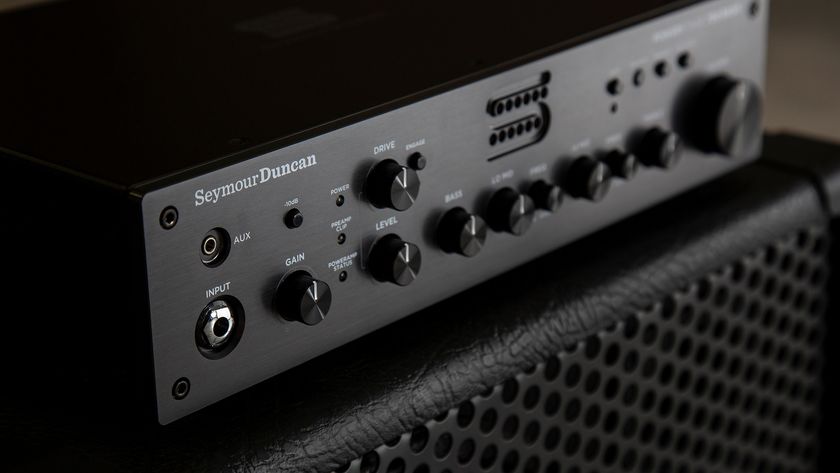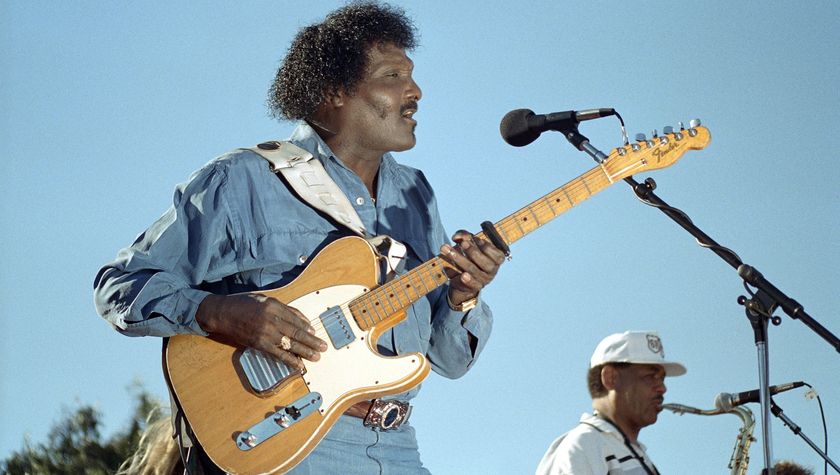Coheed and Cambria: Rainbow's End
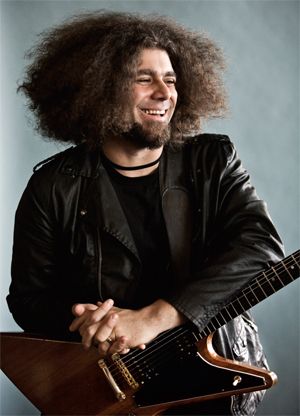
Originally published in Guitar World, July 2010
Coheed and Cambria bring the Armory Wars epic to a conclusion with their latest album—and the prequel to the series—Year of the Black Rainbow.
Progressive rock. Progressive metal. Progressive nu-metal. Over the years, singer and guitarist Claudio Sanchez has heard many such labels attributed to the music made by his band, Coheed and Cambria. “Usually, I try to just laugh them off,” he says. “The only one that really bothered me was when some writer called us ‘progressive emo.’ I mean, that’s just plain dumb.”
His bandmate guitarist Travis Stever concurs. “I don’t care too much what you call us,” he says, “but emo we are definitely not. I never even liked the sound of the word. It sounds…I don’t know—weak.”
“People are under this assumption that we’re purposely trying to be confusing,” Sanchez says, “when really we’re just doing what comes naturally. It’s not like we sit around going, ‘Okay, how can we be supremely arty? What will have everybody scratching their heads?’ The fact is, we want as many people as possible to get into our music.”
Even so, with album titles that would confound even Robert Fripp, such as 2003’s In Keeping Secrets of Silent Earth: 3 (which was their second album) and 2005’s Good Apollo, I’m Burning Star IV, Volume One: From Fear Through the Eyes of Madness, the two guitarists have to admit they aren’t exactly making things easy on themselves.
And then there’s the sci-fi comic books and Byzantine storylines that have been attached to all of the band’s releases, dating back to 2000’s EP Delirium Trigger, when the Nyack, New York–based band went by the name Shabütie. Entitled The Armory Wars, the comic books loosely tell the story of the band through characters named Coheed and Cambria. “And that in and of itself is a mind bender,” says Sanchez, “because a lot of people think Travis and I are named Coheed and Cambria.”
Get The Pick Newsletter
All the latest guitar news, interviews, lessons, reviews, deals and more, direct to your inbox!
“It happens all the time,” Stever says. “At gigs and these meet-and-greet things we do, somebody will always come up to me and go, ‘Now, which one are you, Coheed or Cambria?’ Then I’ll say, ‘Actually, my name is Travis.’ And they think I’m joking! We get into some weird things with this band.”
Although Sanchez killed off the characters Coheed and Cambria on the band’s debut album, 2002’s The Second Stage Turbine Blade, he revisits them on the group’s latest release, Year of the Black Rainbow. Yes, there’s another installment of The Armory Wars comic (only this one is the beginning of the tale), and there’s even a 352-page Year of the Black Rainbow novel, co-written by Sanchez and Peter David, which will be included with the pricier, super-deluxe edition of the CD. “I know a lot of people might roll their eyes when they hear I’ve written a novel to go with the album,” Sanchez says. “But I felt it was important to explain a lot of unanswered questions people had about the characters of Coheed and Cambria. A lot of our fans really seem to care about them.”
Highfalutin’ concepts, comic books and novels are all very well and good, but none of it matters if the music isn’t there. And on Year of the Black Rainbow, co-produced by Atticus Ross (Nine Inch Nails, Jane’s Addiction) and Joe Barresi (Queens of the Stone Age, Tool), Coheed and Cambria—the band, not the characters—have, for the most part, refined their dark, epic approach to songwriting and come up with some concise and catchy rockers, like the first single, “Here We Are Juggernaut.” Brutal rhythms and gnashing guitars still rule the day, but they’re augmented by sequencers and synth atmospherics. The relatively sunny, wave-your-BlackBerry-in-the-air ballad called “Far” might throw longtime fans for a loop. “That one’s probably about as close to American Idol as you’re going to get from us,” Sanchez says. “And if you don’t like it, cool. There’s plenty of other stuff to check out. Nothing repeats itself on this album.”
It’s 10 a.m. on a Tuesday morning as Sanchez and Stever gear up for a noon rehearsal with the band, which also includes bassist Michael Todd and drummer Chris Pennie. Before heading off to the studio, the two guitarists sat down with Guitar World to discuss the new album and why, to quote Sanchez, “progressing musically doesn’t mean you’re ‘progressive rock.’ ”
GUITAR WORLD Claudio, you’ve written the first story of The Armory Wars last. At what stage in the game did you decide to work backward?
CLAUDIO SANCHEZ Actually, it was always my plan to do the first story last. Everything in this story, what’s in the comic books and on the records and stuff, it’s exactly as I planned it.
But you know, while it’s cool to come up with these stories and explore other areas of art, they really aren’t important when it comes down to sitting back and listening to our music. The themes that I’m singing about in the songs are very personal, but the novels and all that other stuff are very different and they’re more like extensions of the music. You know, we have fans who don’t even know about all those other elements. They like our records because they like our records, period.
TRAVIS STEVER See, that’s where I’m at. I’m proud that we have these other aspects that go beyond the songs, but I’m also very committed to the idea that the music has to stand on its own. We’re not a video game; we don’t just serve as the accompaniment to these comic books and stories. If everything else went away, Coheed and Cambria the band would still stand.
GW The group has been pretty stable for the past few years. You’ve had the same lineup since 2007.
STEVER The four of us have been together since 2007, yes. I left a long time ago for a brief period, too, but that was before we were Coheed. I think this is the most secure lineup we’ve ever had. The four people in the band right now are the four people who are supposed to be in Coheed and Cambria. I feel pretty good in saying that.
SANCHEZ Everybody’s on the same page now. The song that we’re releasing as the first single, “Here We Are Juggernaut,” is a huge statement for us as a band. It’s us saying, “Here we are. We’re still here and we’re pushing, and you can’t knock us down.” When I wrote that song, it was about me and my wife and the power of our relationship, but when the band got into the studio and recorded it, suddenly it became about Coheed and Cambria—how we’re still here in 2010 and nothing can stop us.
GW For this record, you worked with producers Atticus Ross and Joe Barresi. Why did you want to work with them, and what did they bring to the project?
SANCHEZ I’ve wanted to self-produce our records for a while, but I don’t know if I’ve found the right relationship with an engineer to be able to do that. Atticus works with electronics and loops, and that’s something that I’ve always wanted to dabble in. He brought up working with Joe and it sounded good.
We all got together in Los Angeles and did a song with them called “When Skeletons Live” as a sort of test. Everything sounded great, so we said, “Cool. Let’s make an album.” It was a terrific match right off the bat. They were very cool with trying different sounds and bringing in a cinematic element to the mix, which, of course, works well with the kind of music we make.
STEVER What I really liked about working with Atticus and Joe was that they were very much in the here and now. Their attitude was, “Go in the control room and play!” It didn’t matter if I had demoed something previously—they were interested in what I was going to come up with at that moment. A lot of off-the-cuff stuff I played ended up on the record.
GW Did the band track songs live, or were things done in sections?
STEVER For the most part, we did all the rhythm tracks live, as a band. The layers of guitars, the leads and all the little ornamental parts were done after the fact.
GW How do you go about writing and demoing?
SANCHEZ We do our homework. We don’t like to go into the studio unprepared. I have a small Pro Tools rig in my house, and I do all the demos on that. Usually, I’ll work out the skeletons of the songs and pass them around to the rest of the band and get their input. I do some collaborating with Travis. But for most of this album I worked on the songs myself, because I wanted to explore ways to make songwriting fun. So I got some modular synthesizers, and I would patch in some oscillators and create these very [Pink] Floyd–y, trance-like bass line pulses, and I would play to them. “Juggernaut” is a song that came about in that way.
GW Are there other songs that came about from this process?
SANCHEZ “Broken” was created in the same way: I had a pulsing kind of synth sound that I wrote to. For a lot of songs, I would just plug my guitar into a series of effects and make noise, very chaotic and random, nothing melodic at all—I was just coming up with atmospherics. After I had the sounds, however, I would find the rhythmic qualities in them and I made loops to work with. It’s madness, in a way, but it works.
GW “Broken” has a lot of disparate guitar parts. There’s a slow, melodic passage—it’s almost bluesy, really—and then there’s an intense bit of shred. Who do you guys listen to for inspiration? You don’t seem to stick to any one kind of style in your playing.
SANCHEZ There’s no one player or band we listen to. I mean, we listen to a lot of stuff, but as far as inspiration goes, we’re kind of in our own world.
STEVER It’s tough to describe. I do a lot of the, as you call it, “bluesy” parts, but I don’t sit down and listen to Stevie Ray Vaughan or anybody before I record. Not that I don’t like Stevie Ray, because I do. But I play what fits, what comes out.
GW In the song “Guns of Summer,” there’s a very cool top-string guitar pattern and then it breaks in a passage of effect-laden shred. Who’s playing that?
SANCHEZ That was me. I had a lot of fun with that. The thing I like most about that song is where I’m emulating a synth sequence by playing a very fast arpeggio. I’m doing that manually—a lot of people think it’s a loop, but I’m doing it all by myself on guitar. [He does a spot-on a capella version of the guitar part.]
GW Well, that’s impressive! Guitar-wise, not vocally, how long did it take you to practice that to get it just right?
SANCHEZ Uh, not long. [laughs] It’s a scale I’ve used before. I played it on In Keeping Secrets. It’s kind of a diminished arpeggio, I think, and it’s pretty bizarre, which is why I like it so much. It’s a riff that poses a question—the best kind of riff, in my opinion.
GW How do you two divvy up your guitar parts? Is there any kind of formula to how you decide who plays what?
SANCHEZ It depends on where the vocal is sitting. If Travis is playing a lot of melodic lines, I try to make sure my vocals aren’t on top of those. You want the guitar parts to stand out, but on the other hand, the vocals are key.
GW But in a lot of two-guitar bands in which the players are each performing leads, oftentimes there are designated roles: one guy does the slow, melodic parts while the other guy does the intense stuff.
SANCHEZ I know what you mean. Travis and I have our own styles, for sure, but it’s not like I can do things that he can’t, and vice versa. We don’t see ourselves that way. It’s more like, “I’ve got your back here, and you’ve got my back there.” You know what I mean?
STEVER I think, throughout the years, I’ve developed more of a style of writing vocal parts on the guitar. If I really wanted to, I could probably write instrumentals, but that’s just not where my head is at. I like my role in this band. But yeah, what you said about backing up Claudio and serving the song—that’s what I like to do. I’m not out to dazzle the world with my virtuoso chops.
GW That said, how do you push each other as guitarists?
SANCHEZ [pauses] Wow, that’s a good question. [laughs] Geez, I don’t know! You know, we’ve been playing together for so long—
STEVER It’s hard to say where one guy ends and the other begins. We complement each other well. I usually know what Claudio is going to do, and I’m sure he has an idea what I’m going to do. Not that we don’t try to flip each other out and blow the other guy’s mind, because we do. But we have a relationship with each other musically that’s very deep. We don’t have to talk about it. It’s just there.
GW “Here We Are Juggernaut” and “Far” are probably the most radio-friendly tracks on the album. Do you guys care at all about getting airplay, or are you content to sustain your career through all the other avenues bands have these days, like the internet?
STEVER Getting on the radio is a nice thing, but we don’t sit around worrying about it. Sure, it would be cool to get a lot of radio action and then maybe people wouldn’t just toss us off. Wait a second—did I just say that? “Toss us off”? [laughs] You know what I mean—so people don’t think of us as this comic-book band for geeks. Radio play and more mainstream acceptance would help, but who can control that? You write a song and hope people dig it. If not, you write another one.
SANCHEZ Whatever comes is what comes. I try to write music that’s melodic, and if people can appreciate that, that’s great. A song like “Far” was originally intended for another project of mine, but it made sense for this story, this album. I like to try to be diverse, you know, with the prog side of things and the long songs. But I also like trying to get my point across quickly.
GW The last song on the record, “The Black Rainbow,” is quite an opus. How long did it take to write that?
SANCHEZ Not long, really. It’s interesting you bring that one up, because that’s the one track where we all kind of contributed as a band and wrote the song together. We created it in the studio, and it was something of a play off the solo section in “Pearl of the Stars.” We wanted to revisit a theme on the album, and everybody added all kinds of chaos and noise. We haven’t done something like that for a while, and it was a lot of fun. We’re not like those bands that jam together and write songs in an “anything goes” kind of way. On occasion, though, we do get together and play just to see what happens.
GW Even though you bristle at the term “progressive,” your songs are, for the most part, pretty long and complex. They’re not verse-chorus-verse-chorus.
SANCHEZ I guess they’re not. I mean, to us they sound simple, but we’re the ones writing them. We like to challenge ourselves, but we don’t try to write songs that are overly hard to play. We want songs that we can remember and our fans can get into. If they’re not “verse-chorus-verse-chorus,” that’s not a bad thing. It just means we’re…different. [laughs] The term “progressive”…I mean, we do progress; we don’t stay the same. So, in that way, I guess you could call us “progressive.” But you could apply that term to a lot of great bands.
STEVER You could call the Beatles a progressive band. I’m not putting us on their level, I’m just saying every album the Beatles made was different from the one that came before it. Talk about a progressive band!
SANCHEZ Do we have long songs? Yes. But I don’t think they’re the type of vehicles to show off our technical skills. We don’t see ourselves as the sons of Dream Theater or Rush, even though we do like those bands. It’s a weird thing.
GW What kind of practice routine do you guys have on the guitar? Are there aspects of your playing you’re dissatisfied with?
SANCHEZ Yeah, like all of them! [laughs]
STEVER We don’t really sit down and “practice” practice. You know, we don’t have the DVDs and the tablature out and all that; we sort of just play what comes into our heads. Sure, I might zone out on the couch when I’m watching TV and run through, like, scale patterns, but I’m not thinking of what I’m doing. It’s more of a physical release thing.
SANCHEZ I’m not very good at guitar playing. Seriously. I might get by, and I do what I do, but I don’t have a grasp on theory or any of that stuff. I mean, I try to pick up the guitar and practice in the traditional sense, but I have so much going on in my life. Chops is something I don’t have. I wish I could be one of those guys who can sit in with any band and dazzle ’em, but that’s just not me. Maybe one day. We’ll have to see.
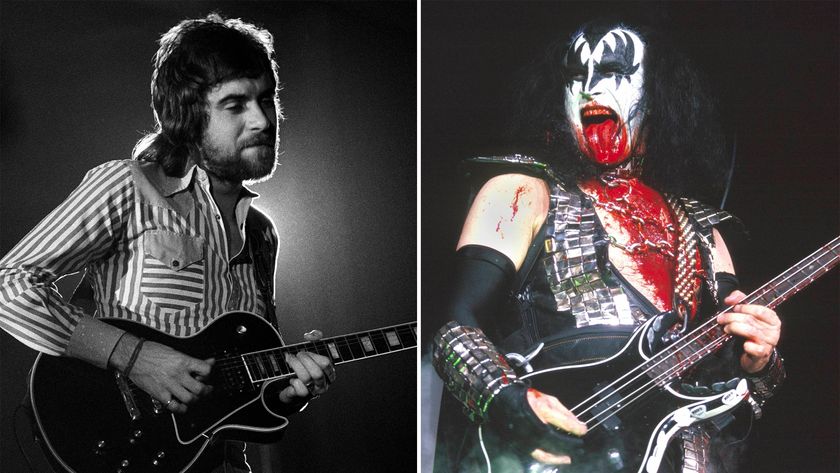
“I had to use the same microphone that Gene Simmons used with all the blood coming out of his mouth. Can you imagine that!” Mick Rogers recalls Kiss supporting Manfred Mann's Earth Band in their early days

“Once Dave got his Roland Space Echo, it changed the vibe… that, and a lot of marijuana”: They inspired everyone from Oasis to the Smashing Pumpkins. Now English post-punk luminaries the Chameleons are back for more

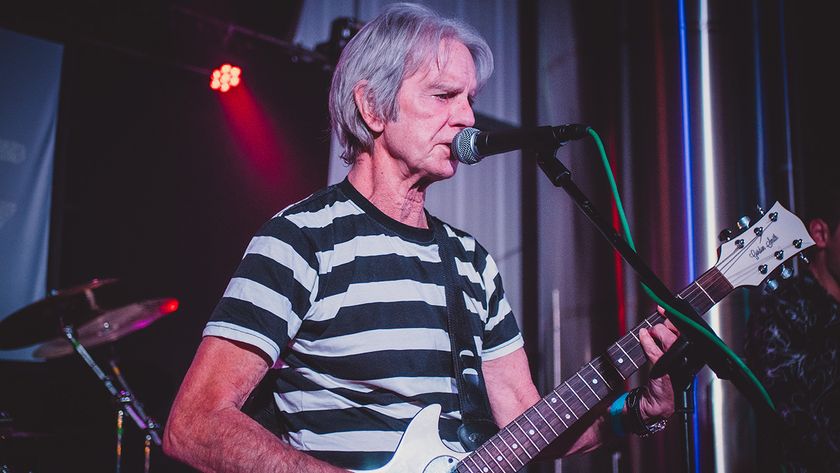
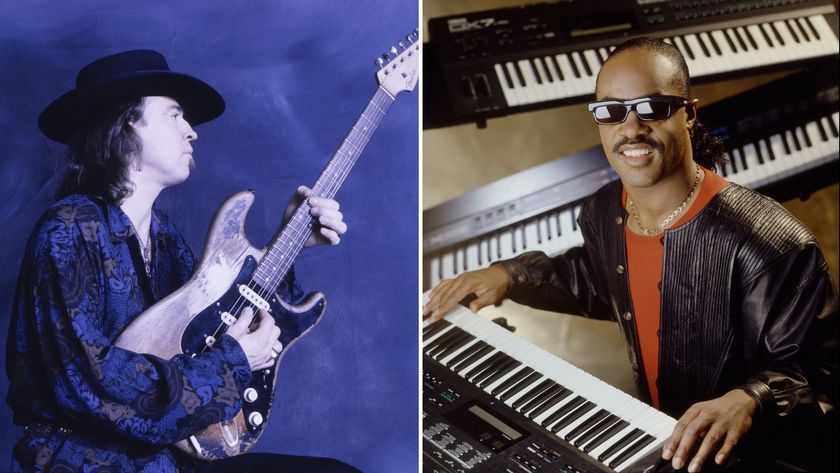
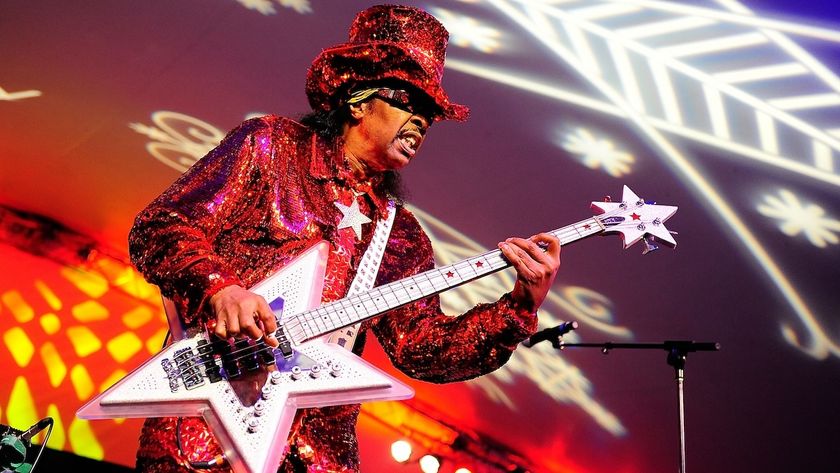
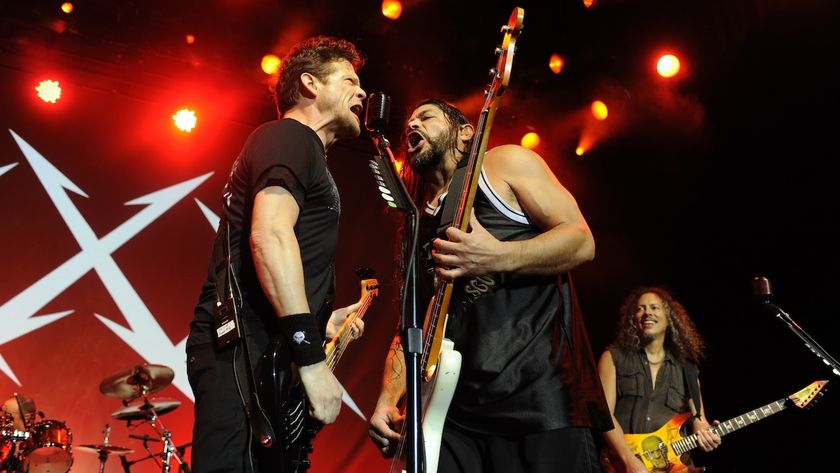
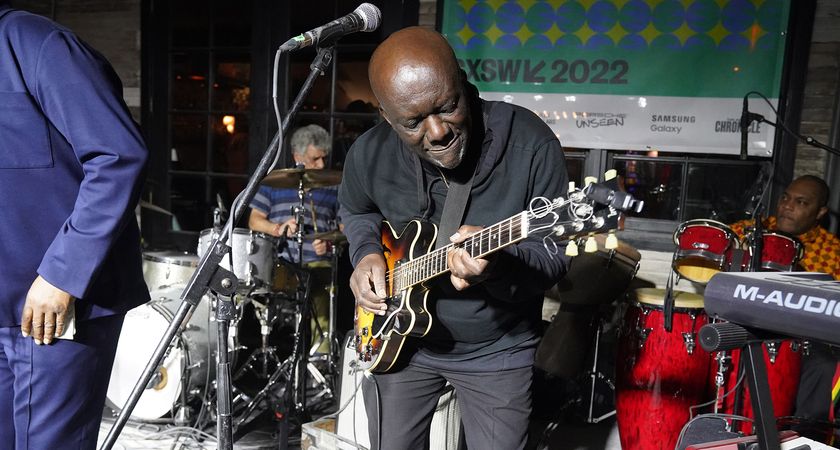
![[L-R] George Harrison, Aashish Khan and John Barham collaborate in the studio](https://cdn.mos.cms.futurecdn.net/VANJajEM56nLiJATg4P5Po-840-80.jpg)
